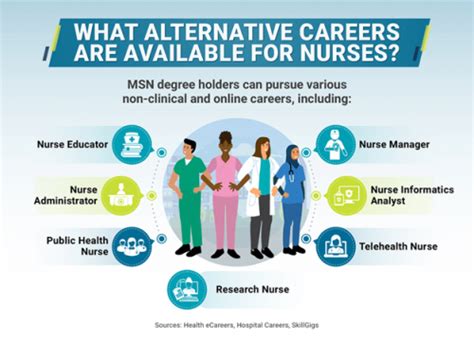Intro
Unlock lucrative nursing career paths with our expert guide. Discover 8 high-paying nursing careers, including nurse practitioner, nurse educator, and informatics nurse, offering median salaries over $100,000. Explore the roles, responsibilities, and growth prospects of these in-demand specialties, and start building a fulfilling and financially rewarding nursing career.
The nursing profession has long been a cornerstone of the healthcare industry, providing compassionate care and support to patients in need. While many nursing careers offer a sense of personal fulfillment and job security, some specialties stand out for their high earning potential. If you're considering a career in nursing or looking to advance your current role, here are eight high-paying nursing careers you should consider.
The demand for skilled and specialized nurses continues to grow, driven by an aging population and an increased focus on healthcare quality. According to the Bureau of Labor Statistics, employment of registered nurses is projected to grow 12% from 2020 to 2030, faster than the average for all occupations. With the right education, training, and experience, you can position yourself for a rewarding and lucrative career in nursing.

Nurse Practitioner
Nurse practitioners (NPs) are advanced practice registered nurses who provide primary and specialty care to patients. They work in a variety of settings, including hospitals, clinics, and private practices, and can specialize in areas such as pediatrics, gerontology, or oncology. According to the Bureau of Labor Statistics, the median annual salary for NPs was $111,840 in May 2020.
To become an NP, you typically need to earn a master's degree in nursing and obtain certification in your population focus area. Many NPs also pursue doctoral degrees, which can lead to even higher earning potential.
Key Responsibilities:
- Conducting physical exams and diagnosing patients
- Developing and implementing treatment plans
- Prescribing medications and ordering diagnostic tests
- Educating patients and families on health conditions and treatment options
- Collaborating with other healthcare professionals to coordinate care

Certified Registered Nurse Anesthetist (CRNA)
Certified registered nurse anesthetists (CRNAs) are advanced practice registered nurses who specialize in anesthesia care. They work in hospitals, surgical centers, and other healthcare settings, administering anesthesia and monitoring patients during surgical procedures. According to the Bureau of Labor Statistics, the median annual salary for CRNAs was $183,580 in May 2020.
To become a CRNA, you typically need to earn a master's degree in nurse anesthesia and obtain certification from the National Board of Certification and Recertification for Nurse Anesthetists (NBCRNA).
Key Responsibilities:
- Administering anesthesia and monitoring patients during surgical procedures
- Conducting pre-anesthesia evaluations and developing anesthesia plans
- Collaborating with surgeons and other healthcare professionals to coordinate care
- Educating patients and families on anesthesia options and risks
- Participating in quality improvement initiatives to optimize anesthesia care

Neonatal Nurse Practitioner (NNP)
Neonatal nurse practitioners (NNPs) are advanced practice registered nurses who specialize in the care of newborns and infants. They work in hospitals, neonatal intensive care units (NICUs), and other healthcare settings, providing primary and specialty care to high-risk infants. According to the Bureau of Labor Statistics, the median annual salary for NNPs was $105,980 in May 2020.
To become an NNP, you typically need to earn a master's degree in neonatal nursing and obtain certification from the National Association of Neonatal Nurse Practitioners (NANNP).
Key Responsibilities:
- Conducting physical exams and diagnosing newborns and infants
- Developing and implementing treatment plans for high-risk infants
- Collaborating with other healthcare professionals to coordinate care
- Educating parents and families on infant care and development
- Participating in quality improvement initiatives to optimize neonatal care

Nurse Midwife
Nurse midwives are advanced practice registered nurses who specialize in the care of women and newborns. They work in hospitals, birth centers, and other healthcare settings, providing primary and specialty care to women during pregnancy, childbirth, and the postpartum period. According to the Bureau of Labor Statistics, the median annual salary for nurse midwives was $115,800 in May 2020.
To become a nurse midwife, you typically need to earn a master's degree in midwifery and obtain certification from the American Midwifery Certification Board (AMCB).
Key Responsibilities:
- Conducting physical exams and diagnosing women during pregnancy and childbirth
- Developing and implementing treatment plans for women and newborns
- Collaborating with other healthcare professionals to coordinate care
- Educating women and families on pregnancy, childbirth, and parenting
- Participating in quality improvement initiatives to optimize maternal and newborn care

Pediatric Nurse Practitioner (PNP)
Pediatric nurse practitioners (PNPs) are advanced practice registered nurses who specialize in the care of infants, children, and adolescents. They work in hospitals, clinics, and other healthcare settings, providing primary and specialty care to pediatric patients. According to the Bureau of Labor Statistics, the median annual salary for PNPs was $108,610 in May 2020.
To become a PNP, you typically need to earn a master's degree in pediatric nursing and obtain certification from the Pediatric Nursing Certification Board (PNCB).
Key Responsibilities:
- Conducting physical exams and diagnosing pediatric patients
- Developing and implementing treatment plans for pediatric patients
- Collaborating with other healthcare professionals to coordinate care
- Educating parents and families on pediatric health and development
- Participating in quality improvement initiatives to optimize pediatric care

Psychiatric Nurse Practitioner (PNP)
Psychiatric nurse practitioners (PNPs) are advanced practice registered nurses who specialize in the care of patients with mental health conditions. They work in hospitals, clinics, and other healthcare settings, providing primary and specialty care to patients with psychiatric disorders. According to the Bureau of Labor Statistics, the median annual salary for PNPs was $114,840 in May 2020.
To become a PNP, you typically need to earn a master's degree in psychiatric nursing and obtain certification from the American Nurses Credentialing Center (ANCC).
Key Responsibilities:
- Conducting physical and mental health exams and diagnosing patients
- Developing and implementing treatment plans for patients with psychiatric disorders
- Collaborating with other healthcare professionals to coordinate care
- Educating patients and families on mental health conditions and treatment options
- Participating in quality improvement initiatives to optimize psychiatric care

Orthopedic Nurse Practitioner (ONP)
Orthopedic nurse practitioners (ONPs) are advanced practice registered nurses who specialize in the care of patients with musculoskeletal conditions. They work in hospitals, clinics, and other healthcare settings, providing primary and specialty care to patients with orthopedic disorders. According to the Bureau of Labor Statistics, the median annual salary for ONPs was $112,410 in May 2020.
To become an ONP, you typically need to earn a master's degree in orthopedic nursing and obtain certification from the Orthopedic Nurses Certification Board (ONCB).
Key Responsibilities:
- Conducting physical exams and diagnosing patients with musculoskeletal conditions
- Developing and implementing treatment plans for patients with orthopedic disorders
- Collaborating with other healthcare professionals to coordinate care
- Educating patients and families on orthopedic conditions and treatment options
- Participating in quality improvement initiatives to optimize orthopedic care

Informatics Nurse Specialist
Informatics nurse specialists are advanced practice registered nurses who specialize in the design, implementation, and evaluation of healthcare information systems. They work in hospitals, clinics, and other healthcare settings, providing expertise on the use of technology to improve patient care and outcomes. According to the Bureau of Labor Statistics, the median annual salary for informatics nurse specialists was $118,370 in May 2020.
To become an informatics nurse specialist, you typically need to earn a master's degree in nursing informatics and obtain certification from the American Nurses Credentialing Center (ANCC).
Key Responsibilities:
- Designing and implementing healthcare information systems
- Evaluating the effectiveness of healthcare information systems
- Collaborating with other healthcare professionals to coordinate care
- Educating patients and families on the use of technology to improve health outcomes
- Participating in quality improvement initiatives to optimize the use of technology in healthcare

As the healthcare industry continues to evolve, the demand for skilled and specialized nurses is expected to grow. Whether you're just starting your nursing career or looking to advance your current role, these eight high-paying nursing careers offer a range of opportunities for professional growth and development.
We hope this article has provided you with valuable insights into the world of high-paying nursing careers. If you have any questions or comments, please don't hesitate to share them with us. We'd love to hear from you!
What is the highest-paying nursing career?
+The highest-paying nursing career is typically the certified registered nurse anesthetist (CRNA) role, with median annual salaries ranging from $150,000 to over $200,000 depending on location and experience.
Do I need a doctoral degree to become a nurse practitioner?
+No, you typically need a master's degree in nursing to become a nurse practitioner. However, some nurse practitioners may choose to pursue doctoral degrees, such as a Doctor of Nursing Practice (DNP), to advance their careers or pursue academic or research roles.
What is the job outlook for nurse informatics specialists?
+The job outlook for nurse informatics specialists is strong, with the Bureau of Labor Statistics predicting a 13% growth in employment opportunities from 2020 to 2030. This growth is driven by the increasing use of technology in healthcare and the need for skilled professionals to design, implement, and evaluate healthcare information systems.
